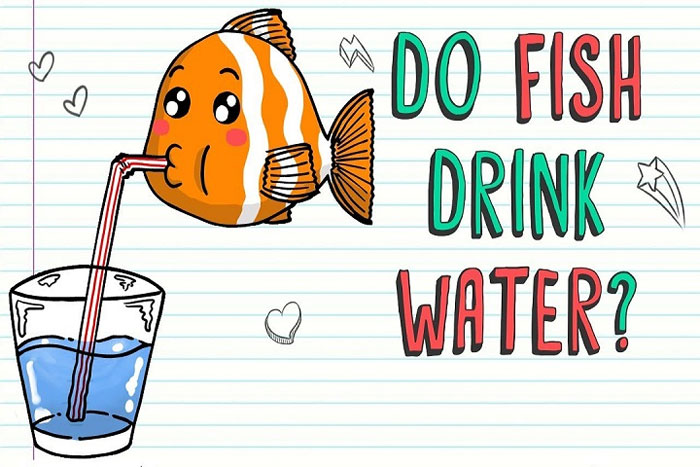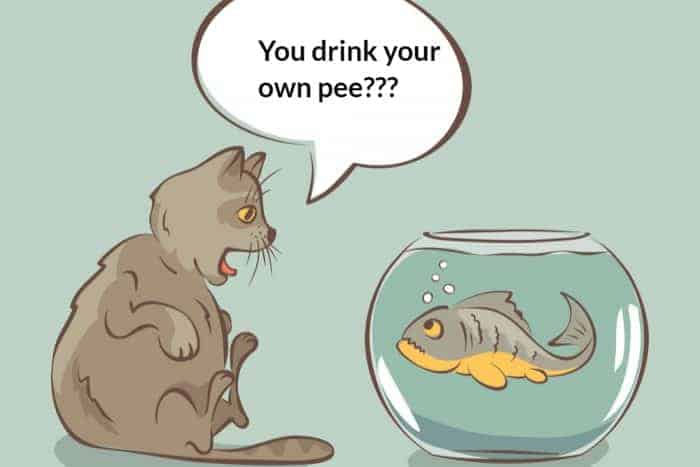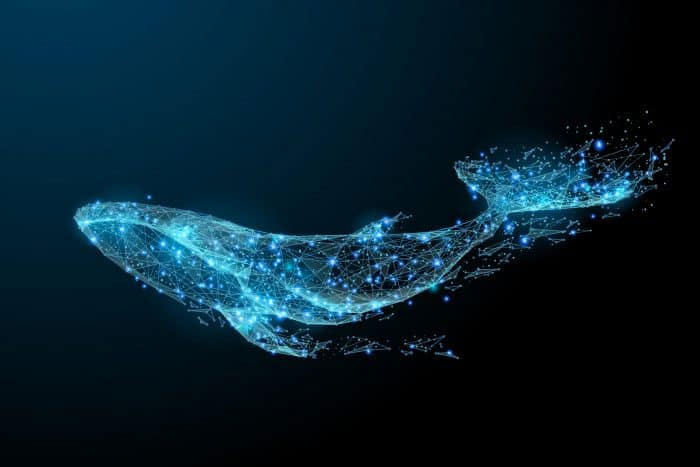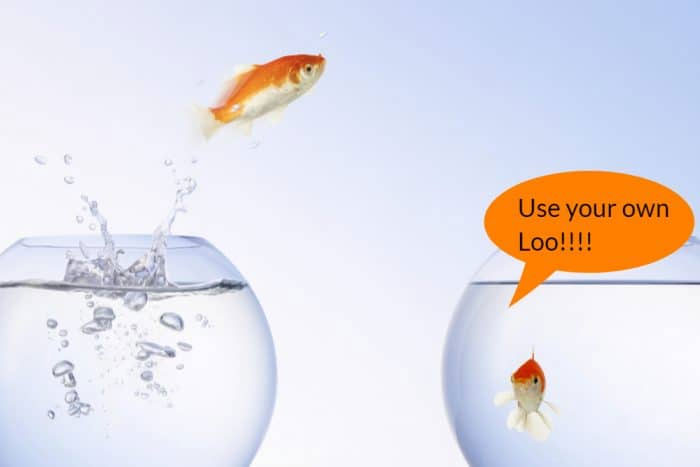Everyone knows that fish live in water, but will they ever drink water? Is this question too simple? The truth is not that simple.
The staggering truth about fish surprised everyone
I’m sure neither you nor you questioned this before reading this article. I always thought that every fish needed water until my 4 year old grandchild asked me if a fish needs water like a human.
Of course, as an uncle, I have to find an answer. So, do fish drink water?
The short answer is yes. But it depends what fish you are talking about. Basically, freshwater fish don’t drink water because the water will make their blood too watery. On the other hand, saltwater fish drink a lot of water to store water in the body.

Fish also drink water.
Are the fish thirsty?
Speaking of whether the fish drink water, I think of whether the fish is thirsty? For example, at home, we only drink water when we are thirsty. The feeling of thirst is a bodily form that signals that we need to be hydrated.
But the problem gets a little more complicated for fish.
Fish live their entire lives in water, so how can an organism living in water get thirsty? Are you hungry when there is still food in the house?
However!
The answer is not that simple. Saltwater fish and freshwater fish have different biological anatomy which leads to different behaviors in drinking water.
Fish don’t really need to be thirsty to drink. Drinking water is just a reflex that occurs without a decision of their body. Therefore, it can be said that the whole species never thirsts.

The mechanism of drinking water in freshwater fish
In fact, the blood salt concentration of freshwater fish is much higher than the water around it. So if freshwater fish drink water, they have a higher risk of thinning the blood. This is why freshwater fish do not drink.
Instead, they use an osmotic mechanism. Freshwater fish absorb water through their gills and skin. In addition, they also excrete much more diluted urine to remove excess water from the body.
Saltwater Fish Consumption Mechanism
Compared to the surrounding water, saltwater fish have much thinner blood. They are therefore always faced with the risk of dehydration.
That is why saltwater fish should actively drink water. Thanks to the special gills, saltwater fish can drink seawater, process and expel any excess salt.
What about fish that may be viable in both salt and freshwater?
There aren’t many species of fish with these abilities. A good example is salmon, which are able to migrate from salt water to fresh water.
So, do they need to drink water?
How can they exist in two completely different environments?
Juvenile trout are born in freshwater and undergo three major transformations before leaving their birthplace to return home to saltwater.
First of all, they will drink a lot of water.
Then their kidneys will decrease urine production.
And most importantly, the mechanisms in their gills begin to work in reverse, removing them instead of absorbing salt from the water.
As salmon mature, they have to return to freshwater to spawn, they spend a few days in an intermediate environment, also known as mudflats (coastal waters or areas with exposed seabed). at low tide). Here their bodies will reverse the whole transformation process when they are young so that they can survive in fresh water.
The answer, then, is species of fish capable of living in both drinking water environments.
Will other creatures living in the water drink?
Of course, it’s not just fish that live in the water. And their neighbors? Do whales, dolphins or turtles need to drink water?
We all know that these creatures, like all others, need water. The point to be clarified here is whether or not they drink water from their surroundings.
Do whales drink water?

Whales must replenish their bodies by drinking the water around them or by absorbing them from food.
Whales are classified as aquatic mammals. They need to replenish their bodies by drinking water around them or by absorbing them from food. The whale has very large kidneys, it can excrete excess salt without losing too much water.
And other interesting information about whales such as they don’t sweat or lose water while breathing. As humans, we breathe, we lose a lot of water. The reason for this difference is that the layer of air on the surface of the ocean is filled with water vapor, so whales do not lose water when breathing.
Do dolphins drink water?
Like whales, dolphins are also aquatic mammals. One theory is that dolphins absorb water from their food. Squid, fish, and octopus contain a lot of water in the body and dolphins absorb water from their prey. This method is much more effective than drinking seawater directly.
There is also the theory that when dolphins catch prey, they also drink some of the surrounding water. In addition, the dolphin has a very advanced filtration system. This amazing mechanism allows them to easily extract additional salt from the urine to make it easier for them to separate the salt from drinking seawater.
Do turtles drink water?
Turtles are reptiles that can live both on land and in water. But since the turtle spends most of its time on land, its body needs to be completely hydrated. Thus, it can be concluded that turtles drink water.
Turtles mostly drink water when swimming or swimming in water. Some sea turtles that live primarily in saltwater environments have to filter the salt from the water they drink. To do this, sea turtles have a special species behind the orbit, called a “salt gland”.
When sea turtles drink salt water, the salt is transferred into the bloodstream and travels through the blood vessels to the salt glands. The saline gland then creates twice as much salt solution as drinking water and pushes them out of the corner of the eye.
Since turtles drink water while swimming, for those who keep turtles, it is important to clean the container and change the water regularly. In nature, animal wastes are eliminated by other organisms. However, in a closed environment, the waste will settle to the bottom of the tank and accumulate there. Therefore, farmers should clean and change the water regularly to reduce the risk of disease for turtles.
What happens when aquatic mammals drink too much seawater?
This question is quite complicated. If aquatic mammals take in too much salt, they will begin to exhibit dangerous symptoms such as kidney failure, liver failure, and other motor problems.
This is because underwater mammals have to filter and remove excess salt when drinking seawater, which helps them to avoid organ damage caused by excess salt.
Is the fish “going light”?
Everyone knows that fish “get heavy”. The main evidence is that a pile of sediment can appear at the bottom of the tank if you don’t clean it regularly. What about “going light”?
If you stop cleaning the tank, after a while it will start to smell of ammonia. So the answer is too obvious. Yes, the fish “go lightly”.
However, each different species will have a different way of “walking”. But basically, the fish constantly “light up”.
The fish “go light” like?

Most fish “get light” with their pores or gills.
Most fish “get light” with their pores or gills. These gill loops will remove the urine that has been filtered by the kidneys. On the other hand, saltwater fish “clear” over the gills, while freshwater fish use the urinal.
As mentioned above, saltwater fish live in an environment with a higher concentration of salt in the body. As a result, saltwater fish absorb large amounts of salt from their environment and they have to remove this salt from the body. During this time, freshwater fish need to get rid of excess water in the body.
Fish kidneys
All fish have two kidneys. The posterior kidneys filter waste through the urinary tract and the anterior kidney to filter waste through the gills.
With saltwater fish, the kidneys excrete ions and store water and remove most of the waste through the gills. With freshwater fish, the way their kidneys work is the exact opposite of saltwater fish. They remove water and retain ions.
Fish urine
Ammonia is the main ingredient in fish urine. Ammonia exits the body of the fish through the gills and again it depends on the type of fish we are talking about.
In addition, fish urine contains organic creatine and creatinine acids, amino acids, and amounts of urea. The urine of freshwater fish is primarily water, while the urine of saltwater fish is primarily salt.
Saltwater fish don’t produce too much urine, but they are extremely concentrated. In contrast, freshwater fish produce a lot of urine.
What color is the urine of fish?
Fish urine is very different from human urine. Fish urine is usually black or gray.
Types of kidney and urinary tract diseases in fish
Fish can also suffer from diseases of the urinary tract and kidneys.
Just like us, fish can also suffer from urinary tract and kidney diseases. These diseases often appear in fish due to a parasite called Kidney Dropsy. This parasite usually occurs on carp and goldfish. Animals attacked by the parasite often have a swollen abdomen due to the accumulation of fluid when the kidneys stop working.
Another parasite called Sphaerospora angulate often causes kidney failure in carp species. This parasite causes the subject’s abdomen and eyes to swell and will not be able to live for more than 6 months.
In addition, commercial salmon and adult salmon often suffer from proliferative kidney disease. The symptom of this disease is that the fish becomes strangely lethargic and sluggish.
Fish use urine to show their class
According to some studies, fish “go lightly” on other fish when they want to let the opponent know who is the boss here.
What have we learned?
Fish, of course, live underwater. Some live in salt water, some live in fresh water.
Although some species of fish can last up to a few days on land, most will die later if they cannot return to the water. The reason is that their lungs are structurally different from those of any mammal. When mammals breathe, the lungs are filled with air and special cells filter the oxygen from the air. During this process, the lungs will be completely dry and free of fluids. During this time, the fish will suck water into the mouth and use gills to filter oxygen from the water.
In addition, all animals need water to live, so all must drink or absorb water, including aquatic animals. How aquatic species replenish the required amount of water depends on the aquatic environment in which they live and the biological mechanisms of each species.
Saltwater organisms must maintain a balance of salt concentration in the body due to the high salt concentration in the habitat. As a result, their bodies have adapted to be able to remove large amounts of excess salt. Freshwater species do not face this problem, but they do need to keep the salt levels in the body at safe levels. Aquatic mammals have an additional mechanism to keep the lungs dry and keep their bodies safe in salt and water.
Some other questions
Can you use tap water for Betta fish (fighting fish, fighting fish)? Yes you can. You should not use distilled water because it does not contain the oxygen and minerals necessary for the fish to live healthy. In fact, tap water is the best option. You should let the tap water “breathe” for about 1 day to remove the chlorine, then let it come to room temperature. In addition, you can also use other water treatment products.
Do fish cry? Fish don’t cry like humans. They don’t have the cortex and nervous system to induce emotional responses like humans do. However, scientists found that they did not cry, but only with sound.
Do fish know boredom? The answer is yes, especially goldfish. The expression of boredom can be mistaken for symptoms of lack of oxygen or many people assume that they are asking for food. Goldfish rarely beg for food, and when they lack oxygen, they swim only near the surface of the water. You can keep an extra fish or plant other aquatic plants in the aquarium to make it more fun.


